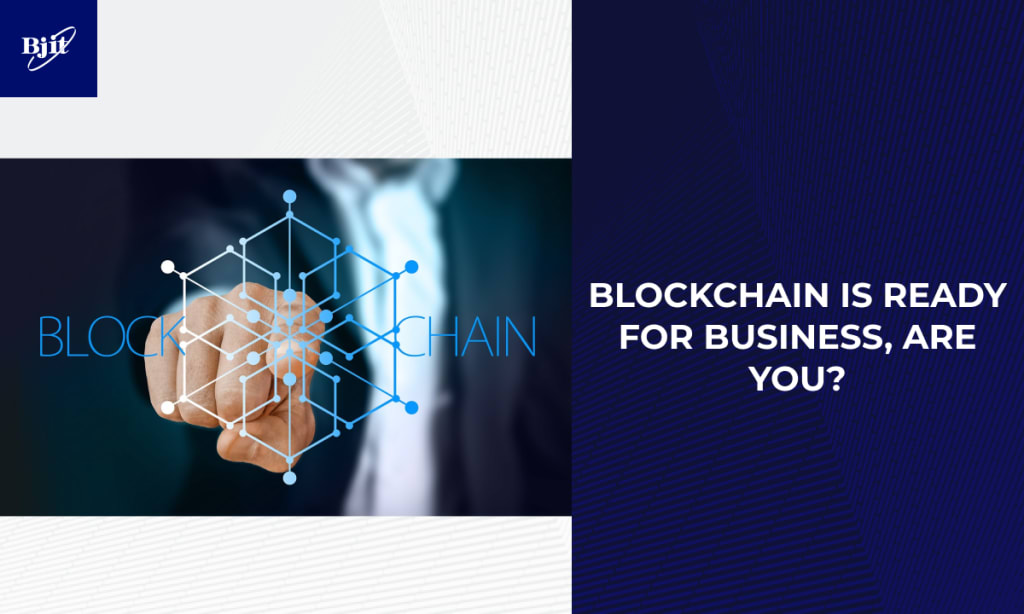
The corporate world has seen a steady infusion of new ideas and innovations in recent years. Companies are looking for innovative technologies because they need them to survive in the digital age. One of the major technologies accelerating corporate change is blockchain technology. Digital transformation for enterprises helps them to make strategic decisions, streamline business processes, and develop new business models by leveraging market-disrupting technologies.
As a result, blockchain technology is now much more widely used outside of the bitcoin and cryptocurrency sectors.
The foundation of blockchain for business is a distributed ledger technology that can be shared across certified partners. Its peer-to-peer topology reduces additional running costs while enhancing transaction transparency, data resilience, and security.
In this article, we'll go through the different ways that blockchain technology might help your company's operations.
Well-known firms, governments, and philanthropic groups are utilizing blockchain technology to improve current operations and build new business models.
Learn More: Where Will Digital Transformation Managed Services Lead Us?
Blockchain's use stems from its ability to quickly and securely exchange data between businesses without forcing any of those firms to be in charge of safeguarding the data or executing transactions.
The specialists at BJIT, a blockchain software development company in Bangladesh, have identified the following as the top blockchain advantages:
Trust
In instances where trust is either lacking or untested, blockchain establishes trust among several organizations. Because of this, these companies are prepared to engage in business practices that include transactions or data transfers that they otherwise would not have undertaken or that would have required an intermediary. One of the advantages of blockchain that is most frequently highlighted is the simplicity of trust.
Decentralized structure
Blockchain really demonstrates its advantages when there is no central authority to foster confidence.
Hence, blockchain enables data sharing across an ecosystem of businesses where no one organization has complete control. It also helps to build trust when parties need more confidence since they don't know each other well. Nevertheless, nobody is responsible for facilitating all of that information flow. Numerous companies, ranging from manufacturers, distributors, and retailers to suppliers and transportation companies, want or need information from other companies in the chain. The blockchain's decentralized organization solves this issue.
Improved security and privacy
The security of systems that employ blockchain technology is another significant benefit of this new technology. Because of how the technology works, blockchain has increased security. Blockchain creates an immutable record of transactions using end-to-end encryption, eliminating fraud and other undesirable activities. Moreover, hacking is challenging due to the distributed tracking nature of the data on the blockchain across a network of computers. Additionally, by encoding data and requiring permissions to restrict access, blockchain can better solve privacy issues than conventional computer systems.
Reduced costs
The goal of developing blockchain software is to save businesses money. The effectiveness of transaction processing is increased. Furthermore, it reduces manual activities such as data aggregation and auditing processes. It also streamlines reporting and auditing procedures while reducing manual tasks such as data gathering and correction. The capacity of blockchain to quicken clearing and settlement quickly translates into process cost reductions, according to experts who observed the savings that financial institutions realize when using blockchain. In general, blockchain reduces expenses for businesses by managing processes that it is capable of executing without the need for middlemen such as suppliers and third-party providers.
Speed
As there are no intermediaries and no longer any human processes involved in transactions, blockchain handles transactions more quickly than previous methods. Blockchain transactions can occasionally be finished in a few seconds or less. The size of each data block and network activity are only two examples of the many factors that might affect how quickly a blockchain-based system can process transactions.
Nevertheless, according to experts, blockchain frequently exceeds conventional methods and technology in terms of speed.
Visibility & traceability
All parties can see every transaction on the blockchain. In conventional supply chains, transactions between two parties—such as a producer and a retailer—might not be visible to a third party. Every transaction in the supply chain is recorded on the blockchain using blockchain technology as an immutable, unbreakable block. All parties involved in the supply chain have access to every transaction. Blockchain technology increases the transparency of supply networks.
Another issue is figuring out if things are real or fraudulent.
If there is no system in place to trace each item back to its source, fake items may enter the supply chain. As a result, supply chains need a system that will let networks trace every product back to its manufacturer. Traceability is a key aspect of blockchain ledger technology. This capability will aid supply chains in their fight against unethical practices and fake products.
Immutability
Immutability basically implies that once a transaction is put on a blockchain, it cannot be changed or deleted. Every transaction on the blockchain is both time and date-stamped, establishing a permanent record. As a result, blockchain may be used to monitor data across time, providing a safe and trustworthy audit of data.
Software company in Sweden uses blockchain technology to digitize real estate transactions and track property titles as they shift hands exemplifies the potential of this benefit.
Individual control of data
Experts claim that blockchain provides degrees of personal sovereignty over one's own digital data that are unmatched. In a world where data is a very valuable commodity, technology innately protects your data while allowing you to govern it. Because of blockchain-enabled smart contracts, individuals and corporations may select which parts of their digital data to disclose, with whom, and for how long.
Tokenization
Tokenization entails transforming the value of an asset into a digital token, which is subsequently recorded and distributed via the blockchain. Tokenization has been successful with digital art and other digital products, but it has broader applications that may expedite corporate transactions. Utilities, for example, might utilize tokenization to sell carbon emission permits under carbon cap regimes.
Innovation
Executives across a range of industries are experimenting with and implementing blockchain-based technology to improve antiquated, time-consuming processes and address unsolvable problems. One example of this innovation is the use of blockchain to verify the information on resumes submitted by job seekers. According to studies, many job candidates fabricate their resumes, which makes hiring managers spend time manually verifying the data. But, pilot programs that allow participating universities to store information about their graduates and their degrees on the blockchain and then make it available to authorized hiring managers assist in overcoming both issues—getting to the truth efficiently.
How can BJIT help you with Business Transformation?
BJIT, an IT offshore outsourcing company, is known for offering top-notch solutions supported by cutting-edge technologies like blockchain. The business has helped a number of international clients create customized blockchain applications that meet the demands of business stakeholders now and in the future. Early adopters of innovative technology, the talented Offshore Development Teams in Bangladesh at BJIT have a broad customer base across several industries. BJIT supports businesses in exploring the world of secure, decentralized apps by taking a strategic approach.
Also Read: Prepare For The Future of Digital Innovation with BJIT
Conclusion
With security, data analysis, and administration, a blockchain software development company provides a distributed ledger system that improves the media supply chain and reduces copyright infringements. As more sectors, such as healthcare, logistics, manufacturing, and information technology, use blockchain technology to anticipate and resolve urgent issues, its importance is expanding. Together with other transformative technologies such as AI, Big Data, and Cloud, blockchain has proven to be a game changer in various business industries. Because of this, you are in no position to lose out on the economic opportunities that modern technology may present you with only because you choose to live in the past.
BJIT is a blockchain software development company in Bangladesh that connects you to the world while managing challenging projects using Web3 Blockchain Development Technologies.
About the Creator
BJIT
BJIT is the Pioneer to enter the Japanese IT market. Now, BJIT is working with world-renowned clients like Sony, BMW, QUALCOMM, Kyocera, Valmet, Dassault Systemes, NTT Docomo, Panasonic, Fujisoft, Toshiba, etc.






Comments
There are no comments for this story
Be the first to respond and start the conversation.